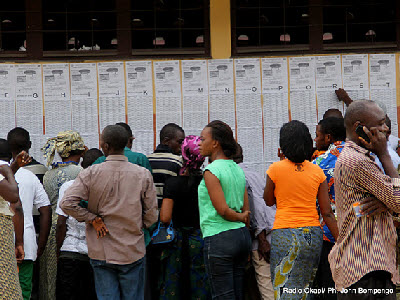There was scattered violence in Katanga and Kasai-Oriental provinces. Three people were killed after gunmen attacked policemen posted at the Nanja School polling station in Lubumbashi. Unhappy voters burned three polling stations in Kasai-Oriental Province.
In the capital Kinshasa, the violence feared after weekend clashes between supporters of the main presidential candidates did not materialize. President Joseph Kabila and his main challenger, Etienne Tshisekedi, voted in Kinshasa.
Voting was peaceful elsewhere around DR Congo. People started lining up as early as 4 am to choose their president and national Members of Parliament. Most polling stations opened as early as 6am.
People were handed a list of the 11 presidential candidates and the more than 18,000 parliamentary candidates, each with a unique number, to pick from as they entered the voting booth.
Observers sent by candidates, and other local and international observers, witnessed the elections. The INEC, which includes members named by opposition parties and the ruling majority, accredited the observers before the elections.
"It's a victory for the INEC, but also for the Congolese people", Jacques Djoli, the vice-President of the Independent National Electoral Commission said about the elections Monday night on RTNC TV.
Amid fears and allegations of fraud before the elections, there were tensions at some polling stations, as voters and observers wanted to make sure that ballot boxes had not already been stuffed with votes.
Voting was allowed to proceed after 5pm on Monday at polling stations that still had people in line to vote.
The INEC has extended voting at polling stations where people were not able to vote because voting material did not arrive on time.
As vote counting goes on elsewhere around the country, observers are present at the polling stations to witness the count and the results being posted at each station.
The elections results will be announced on December 6, the last day of President Kabila's five-year term.
Related articles
- • DRC and Rwanda Sign Declaration of Principles for Peace in Eastern Congo (April 25, 2025)
- • UK Suspends Financial Aid to Rwanda Over M23 Rebellion (February 25, 2025)
- • DR Congo Citizens Head to Polls to Elect President, Members of Parliament (December 20, 2023)
- • Felix Tshisekedi Sworn In as DR Congo President (January 24, 2019)
- • Constitutional Court Declares Tshisekedi Winner of Presidential Election (January 19, 2019)
- • Martin Fayulu Challenges Presidential Election Results in Court (January 12, 2019)
- • Felix Tshisekedi Vows to Be the President of All Congolese (January 10, 2019)
- • Martin Fayulu Rejects Presidential Election Results (January 10, 2019)
- • Felix Tshisekedi Elected DR Congo President (January 10, 2019)
- • DR Congo Delays Results of December Election (January 6, 2019)
- • Bemba, Katumbi renew their support for joint opposition presidential candidate Fayulu (November 16, 2018)
- • Vital Kamerhe also withdraws support for joint opposition presidential bid (November 12, 2018)
- • Felix Tshisekedi withdraws support for joint opposition presidential bid (November 12, 2018)
- • Jean-Pierre Bemba banned from running for president (August 25, 2018)
- • Vital Kamerhe named UNC presidential candidate (August 4, 2018)
- • Bemba says Katumbi should be allowed to run for president (August 4, 2018)
- • Moise Katumbi blocked from entering DR Congo (August 3, 2018)
- • Jean-Pierre Bemba Returns to DR Congo (August 1, 2018)
- • Jean-Pierre Bemba named MLC presidential candidate (July 13, 2018)
- • At least 30 dead after massacres in Ituri (March 2, 2018)
- • Botswana Urges Joseph Kabila to Step Down (February 26, 2018)
- • No elections in DR Congo in December without electronic voting machines: INEC (February 13, 2018)
- • US Warns DR Congo Against Electronic Voting for Delayed Election (February 12, 2018)
- • Presidential election scheduled for December 23, 2018 (November 5, 2017)
- • Felix Tshisekedi accuses INEC of illegally prolonging Kabila's mandate (October 24, 2017)
- • DRC Seeks Arrest of Presidential Candidate Moise Katumbi (May 19, 2016)
- • Papa Wemba Is Buried in Kinshasa (May 4, 2016)
- • Papa Wemba Awarded Highest National Honor as Thousands Pay Tribute (May 2, 2016)
- • DR Congo reach final of African Nations Championship (February 3, 2016)
- • Political tensions 'running high' in DR Congo ahead of 2016 elections (October 7, 2015)
Tags: |








